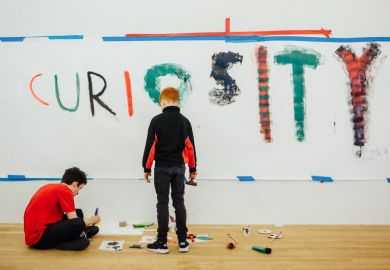Contemporary artist Grayson Perry has expressed concern about the low numbers of students from disadvantaged backgrounds studying arts degrees.
Turner prizewinner Mr Perry, who is chancellor of the University of the Arts London, told Times Higher Education that the predominance of middle-class students on creative courses was bad for the sector, and suggested that higher education institutions needed to make greater efforts to widen participation.
“As a lover of the arts, I don’t like the fact that people seem to think that the middle classes is the only place where we will get talented people. It’s not,” he said. “When I was at art college, most of the students were working class because it was free then. We need a more diverse spread of art students.”
Mr Perry suggested that, in an era of tuition fees in excess of £9,000 in England, many working-class students were put off studying art and design because they did not see it as a subject that would lead to high graduate earnings. "I think there is a deep fear...among working class students [about] the arts...because they don’t see it as a way of making a lot of money," he said.
He questioned the growing focus on employability and suggested that students should choose to study art if they are passionate and driven to create things.
“Sometimes I see people in an art college and they don’t seem to actually like making art, they like the idea of being an artist and I want to tell them that that is not the right way round,” he said.
Mr Perry, who is best known for his ceramic vases, was speaking at the opening of the new building of the Camberwell College of Arts, part of UAL.
Data from the Higher Education Statistics Agency show that 13 per cent of young UK-domiciled entrants to creative arts and design courses in 2016-17 were from low-participation backgrounds, although this is higher than the average for all disciplines.
David Crow, UAL’s pro vice-chancellor (student experience) and head of Camberwell, Wimbledon and Chelsea colleges, told THE that there was a concern that students were focusing too heavily on the employment options offered by arts degrees, and were overlooking the creative aspect.
But he added that, if fewer students chose arts degrees, the UK’s creative industries could face a drought of new talent, which would have a significant impact on the economy.
Professor Crow added that most arts students ended up in careers in the creative industries and that there is often a better quality of life for those who work in the arts.
UAL’s curricula now include entrepreneurial skills and aim to teach students how to source work and diversify their careers.
The university has also established a bursary scheme with Southwark Council for young people in the local area to come and study at the renovated college.
Register to continue
Why register?
- Registration is free and only takes a moment
- Once registered, you can read 3 articles a month
- Sign up for our newsletter
Subscribe
Or subscribe for unlimited access to:
- Unlimited access to news, views, insights & reviews
- Digital editions
- Digital access to THE’s university and college rankings analysis
Already registered or a current subscriber?






